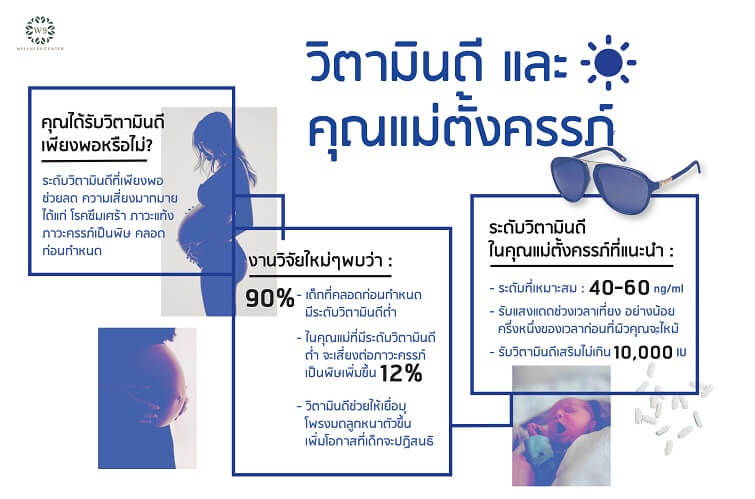
There are many types of vitamin D deficiency, includingVitamin D deficiency Correlated with depression including low vitamin D levels It may affect your ability to control your emotions, decision-making, and behavior, andVitamin D is not a cure for depression. But getting vitamin D compensates. Helps to control emotions and increase the quality of sleep
Depression is often found in patients with chronic illnesses. In the treatment of depression We will use medication along with psychotherapy. It has achieved results of 76-85% (World Health Organization WHO 2020) But only fewer patients with 25% received treatment. However, there are some patients who do not want to take medicine. Because of fear of addiction to drugs or unable to tolerate the side effects that occur And this depression It is like a chronic disease which can come back again.

There is a growing number of research works. Start studyingThe relationship between Depression and vitamin deficiency Many nutrients or minerals such as vitamin B3, vitamin B6, vitamin B12, folate, vitamin D, zinc, copper, magnesium, as well as essential fatty acids such as omega-3 or even some amino acids. Such as GABA, glycine, tryptophan or tyrosine, etc.
And there is also Large research study in England which studied more than 31,000 people It was found that the group of people with depression Have low vitamin D levels significantly than the control group And it was also found that the group that was low in vitamin D There are more people who suffer from depression. The group that has high vitamin D is 121% which can In conclusion, low vitamin D levels are indeed associated with depression.
According to research, low vitamin D levels are considered an important factor affecting depression. and there is enough evidence to Recommended for depressed patients Screening and treatment for vitamin D deficiency
Vitamin D It is a soluble vitamin and is stored in fat. Our brain is also a large piece of fatty tissue. We find Vitamin D Receptors in almost every brain cell. Vitamin D is therefore considered an important hormone. That plays an important role in the functioning of the nervous system and brain. Vitamin D is also responsible for stimulating and inhibiting enzymes. That plays a role in preventing damage, repairing, and building nerve cells in the brain. Vitamin D deficiency not only affects your emotional well-being. But it also affects thinking, reading, memory and brain performance.
The epidemiological research found that Vitamin D is also important for brain development in the womb. Children born to mothers with low vitamin D levels Changes will be found in both the structure and function of the brain. The function of the neurotransmitter dopamine and increase the risk of psychosis in later life
There is a study about Depression in women after giving birth (Postpartum Depression) found that mothers with low vitamin D levels both from before pregnancy during pregnancy until after birth There will be a 2.67 times greater chance of being depressed. And there are some reports that vitamin D supplementation It may have a positive effect on reducing depression.

Treating depression in Functional Medicine also looks at other factors, such as abnormalities.Intestinal microorganisms (Dysbiosis) and accumulated levels of toxins from the environment (Environmental Toxicity) in addition to normal treatment, whichThere are many causes of depression. Such as genetics, chemical imbalances in the brain, poor nutrition, intestinal balance, medications used, and stress.
so Vitamin D deficiency isn't the only cause of depression. But measuring vitamin D levels for people at risk is something that should not be overlooked.
book Healthitude happiness (Udom)motto
Dr. Pijak Wongvisit (Dr. Bye)
3 healthy drinks If you don't want to age prematurely, you must drink! If asked about the concerns that men and women have when they enter adulthood.
Have you ever secretly thought about it? What chemicals do many of us get into our bodies in our ordinary day-to-day lives? Everything around us is contaminated.
Let's check if we have everything in our refrigerator at home. # If you have it, then switch to taking it every day too. 😘 # Your immune system must be strong. #We must be healthy together. # mustn't be stressed either 😆 1. Granola 🌾 is a variety of dried, unpolished grains.